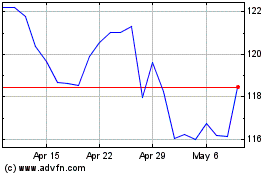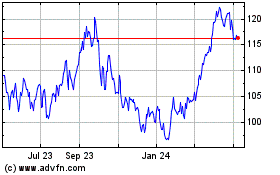By Carol E. Lee and Peter Nicholas
President-elect Donald Trump is widening the circle of
candidates for secretary of state and will interview more prospects
this week, transition officials said, a sign that after multiple
meetings with high-profile hopefuls he still isn't sold on whom he
wants as the nation's top diplomat.
Though Mr. Trump's transition team said last week that the
search had narrowed to four finalists, new candidates have emerged,
including Rex Tillerson, chairman and chief executive of Exxon
Mobil Corp., one transition adviser said.
Mr. Tillerson is scheduled to meet with Mr. Trump for an
interview this week. Alan Jeffers, an Exxon spokesman, declined to
comment.
Vice President-elect Mike Pence, appearing Sunday on NBC, said
the list of secretary of state candidates "might grow a little
bit."
On Sunday evening, Mr. Trump's transition officials said another
candidate for both secretary of state and energy secretary is Sen.
Joe Manchin (D., W.Va.). The conservative Democrat would add a
bipartisan dimension to the Trump cabinet if chosen.
Mr. Manchin has experience in both realms, serving on the
Senate's Energy and Natural Resources Committee and the Armed
Services Committee. His office didn't respond to a request for
comment.
And U.S. Rep. Dana Rohrabacher (R., Calif.) said in an interview
Sunday he is talking to Trump transition officials about the
secretary of state job. He said he has pitched to them an
arrangement in which he would serve in the top job and a deputy
would be John Bolton, a former ambassador to the United
Nations.
Mr. Bolton -- who also is in the running for the secretary of
state post -- held a private meeting with the president-elect
Friday at Trump Tower.
Kellyanne Conway, a senior Trump adviser, told reporters Sunday:
"It is true that he's broadened the search...He's very fortunate to
have interest among serious men and women who, all of whom need to
understand that their first responsibility as secretary of state
would be to implement and adhere to the president-elect's America
First foreign policy, if you will, his view of the world."
A final decision could come by week's end, the transition
adviser said.
Secretary of state is the most prominent missing piece in a
national security team that is quickly taking shape. At a rally in
Cincinnati last week, Mr. Trump announced he selected retired Gen.
James Mattis to head the Pentagon as defense secretary. He has
tapped another retired general, Michael Flynn, to serve as his n
ational security adviser.
Normally an opaque process, the hunt for the next secretary of
state has played out in an unusually public fashion.
Another top candidate is 2012 Republican presidential nominee
Mitt Romney, who clashed bitterly with Mr. Trump during the GOP
primaries this year. Last Tuesday, Mr. Trump had dinner with Mr.
Romney in Manhattan.
Setting aside the campaign hostilities and perhaps trying to
make amends with Mr. Trump's supporters, Mr. Romney told reporters
afterward that he was "impressed" with the transition effort.
Other candidates for the job are former New York City Mayor Rudy
Giuliani, one of Mr. Trump's most loyal campaign supporters; U.S.
Sen. Bob Corker (R., Tenn.), the Foreign Relations Committee
chairman, who also met with Mr. Trump in New York on Tuesday; and
retired Gen. David Petraeus, director of the Central Intelligence
Agency in the Obama administration.
Gen. Petraeus pleaded guilty in 2015 to a misdemeanor charge of
mishandling classified material in a case involving his biographer,
with whom he said he had an extramarital affair. He addressed his
legal troubles in an appearance Sunday on ABC, saying, "I made a
mistake. I have again acknowledged it. Folks will have to factor
that in and determine whether that is indeed disqualifying or
not."
One of the questions Mr. Trump faces is whether he wants a
trifecta of generals as his core national security team. That would
be the upshot if he picks Mr. Petraeus.
Coming to the presidency with no foreign policy or government
experience, Mr. Trump could rely more heavily on his national
security team than his predecessors.
So far he has chosen to largely freestyle his engagement with
foreign leaders, rather than rely on the State Department's
guidance for such conversations.
Mr. Trump sent shock waves through the diplomatic community
Friday when he spoke with President Tsai Ing-wen of Taiwan, the
first conversation between a U.S. president-elect, or president,
and the leader of Taiwan since 1979. The conversation ran against
Beijing's efforts to block formal U.S. relations with the island
off China's coast, which it has long considered a Chinese territory
and not a sovereign nation.
Choosing a secretary of state with scant foreign policy
background, such as Exxon's Mr. Tillerson, could further unnerve
government officials serving in an institution that functions on
strict protocols.
Mr. Trump also faces a decision on whether he wants a more
hawkish foreign policy or one favoring diplomacy over military
engagement.
During the campaign, he signaled that he wants a military
posture that is less interventionist, eschewing "nation-building"
and "regime-change." Yet he has vowed to intensify military action
against Islamic State.
"The balance of personalities in the [White House] Situation
Room is really important. It's one of the few places where all the
parts of government come together to shape foreign policy and
presidential decision making," said Phil Carter, director of the
Military, Veterans and Society Program at the Center for a New
American Security, a bipartisan think tank.
"They have to bring their personalities and their judgment to
the table, " Mr. Carter said. "Who you have in that room and in
that decision process can have a big impact."
Mr. Tillerson, 64 years old, grew up in Texas and joined Exxon
in 1975. He leads a company with operations in more than 50
countries, from Canada to Papua New Guinea, that often exerts
itself abroad with the sweep of a sovereign nation. He is slated to
retire next year and Exxon has identified Darren Woods as a
successor.
As Exxon's CEO since 2006, Mr. Tillerson could leverage existing
relationships with numerous world leaders, including Russia's
Vladimir Putin, with whom he has had dealings for more than a
decade .
Mr. Tillerson's close ties to the company, including tens of
millions of dollars of Exxon shares that will become available to
him in the coming decade, could complicate his efforts to lift
sanctions or intervene in trade disputes where Exxon has a
financial interest. It would be almost impossible for him to recuse
himself from working with all the countries in which Exxon operates
or markets products.
Mr. Tillerson's corporate pedigree would make him an
unconventional choice, foreign policy analysts said. Jon Alterman,
a Middle East expert at the nonpartisan Center for Strategic and
International Studies, noted that former Secretary of State John
Foster Dulles was a lawyer at a top New York City firm, but not a
CEO, and that George Shultz was president of Bechtel Corp., but
also served in government.
"Both are far, far, far smaller companies than Exxon Mobil," Mr.
Alterman said. "I can't think of a CEO with no government
experience becoming secretary of state."
As head of a company with a massive global footprint, Mr.
Tillerson, though, is no stranger to foreign leaders.
As Exxon's chief executive, he has spoken against sanctions on
Russia, where the company in 2012 signed a $3.2 billion deal that
Mr. Putin said could eventually reach $500 billion in
investments.
"We always encourage the people who are making those decisions
to consider the very broad collateral damage of who are they really
harming with sanctions," Mr. Tillerson said at the company's annual
meeting in May 2014.
Mr. Tillerson has some of the closest ties among U.S. CEOs to
Mr. Putin and Russia, with his work there dating back to when Mr.
Putin rose to power after Boris Yeltsin's resignation. The 2012
deal gave Exxon access to prized arctic resources. Later that year,
the Kremlin bestowed the country's Order of Friendship on the
American businessman.
Mr. Tillerson supported a Trump rival in the Republican
primaries: Former Florida Gov. Jeb Bush. He gave the maximum $2,700
to the Bush campaign, and another $5,000 to the Right to Rise, the
super PAC that backed Mr. Bush. He didn't make a contribution to
Mr. Trump's campaign, according to the Center for Responsive
Politics, which tracks political giving.
Bradley Olson and James V. Grimaldi contributed to this
article.
Write to Carol E. Lee at carol.lee@wsj.com and Peter Nicholas at
peter.nicholas@wsj.com
(END) Dow Jones Newswires
December 05, 2016 02:47 ET (07:47 GMT)
Copyright (c) 2016 Dow Jones & Company, Inc.
Exxon Mobil (NYSE:XOM)
Historical Stock Chart
From Aug 2024 to Sep 2024

Exxon Mobil (NYSE:XOM)
Historical Stock Chart
From Sep 2023 to Sep 2024
